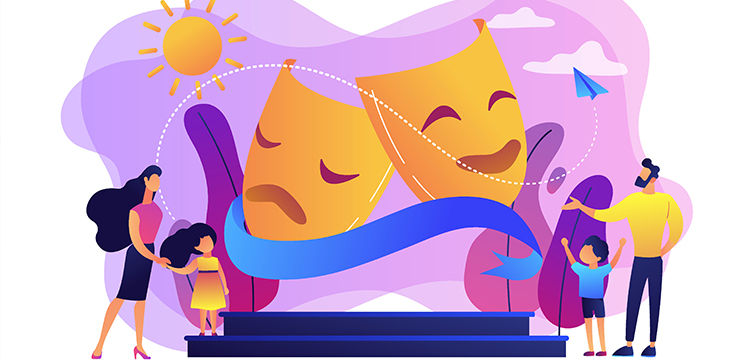Just for one day try it … No TV, no radio, no music, no Netflix, no theatre, no movies, no gaming, no soaps, no fashion, no art… it's easy to forget how important the arts are.
Many sectors of the economy have been badly hit by the pandemic. We often read stories of the impact on hospitality, retail and airlines, yet only occasionally have do we hear about the arts. This is something of an oversight when you think how wide-ranging a part the arts play in our lives and how badly impacted they have been by the economic fallout from Covid. It's easy to miss how important they are, something which critics would suggest even the government has been guilty of.
"Rethink. Reskill. Reboot" – according to some the Coronavirus campaign perhaps mostly likely to win an Academy Award for best Non-Supporting ad of the year. 'Fatima', a young ballet dancer could retrain as an IT worker ('she just doesn’t know it yet') – so said the strapline. Triggering an angry response across the nation, the government were quickly accused of not supporting the creative industries through the pandemic: 'This has to be a joke. Right?' tweeted celebrated choreographer, Sir Matthew Bourne. Some suggested that Chancellor Rishi Sunak’s response was tone-deaf. The ad features original images taken by Atlanta-based photographer Krys Alex who has since said she was 'devastated' when her photo was used. Photoshopped versions of the campaign have since been filling social media timelines, with favourites including one entitled 'Boris's next job could be in ballet' and a picture of Mr Johnson in a tutu. Another viral version points to the ballerina's face stating, 'Application of cosmetics by a Make Up Artist', 'Image taken by a Photographer', 'Clothes and shoes by a Fashion Designer', 'Hair by hair styler' and so on. The point has forcefully been made that the arts play a key role in the UK economy.
According to The Telegraph, a report conducted in August by the Office for National Statistics (ONS) shows 45% of people in the arts industry have been furloughed. The Department for Digital, Culture, Media and Sport (DCMS) calculated an estimated Gross Value Added of £32.03 billion for the industry in 2018. Musicians are expected to lose two-thirds of their income in 2020, causing some to label the pandemic a 'catastrophic blow'. Covid has triggered a 'domino effect' within the music sector, depriving artists of money they would have spent on recording new albums or hiring studios. It has been predicted that musicians and songwriters will lose 65% of their income this year, rising to 80% for those who are dependent on studio work and live performances. Even before the pandemic, a typical musician earned £23,059, well below the national average of £29,832. A 65% pay cut would mean an income of just £8,070.
Theatres are one area to be very hard hit. 'I'll do anything to prove theatres can re-open safely' was Andrew Lloyd Webber's desperate plea to 'get art sectors back open'. Lloyd Webber is confident the air inside his theatres is cleaner than outside as he pleads with government to give his sector a date to reopen properly. He has been trialling measures at the London Palladium that allowed his production of Phantom of the Opera to continue in South Korea with no social distancing and strict hygiene measures. Similarly, the Wigmore Hall has recently started a series of livestreamed concerts, commencing with a song cycle sung by renowned mezzo-soprano Alice Coote. The livestreamed event reached over 6,900 views and even boasted a socially distanced, 'face masked' audience. Used to performing in prestigious venues such as the Metropolitan Opera, New York, this must have been a different experience for the opera star but considering this was her first performance since lockdown 1.0, I’m sure it was welcomed. Perhaps a breakthrough to many, on Friday 4 December it was announced that travelling musicians and other performing artists will no longer have to self-isolate, even if returning to England from a country not on the corridor list. Performing artists are now classed as "business travellers" and are now exempt from quarantine starting from 4am on Saturday 5 December. Announcing the move on Twitter, Transport Secretary Grant Shapps said the new exemptions are 'subject to specific criteria being met', and full guidance will come 'soon'.
Yet perhaps the greatest impact of the arts is in unexpected and personal ways. On Sunday 15 March, a day after a stay-at-home order was issued by the Spanish government, Alberto Gestoso serenaded his neighbours from his balcony. Moments later, Alex le Brontorrent, living a few apartments down joined him on his saxophone, improvising a beautiful instrumental version of Celine Dion’s 'My Heart Will Go On'. Gestoso and Brontorrent did not know each other prior to this moment, and that Sunday afternoon was the first day they ever interacted, connecting on their respective balconies through the power of music. An Instagram video captured of this performance has since amassed over two million views. From balcony concerts to Zoom choirs, music has healing power. It has the ability to take people out of themselves for a little while, which at a time like this is surely very much to be welcomed.
Wayne Bartlett is an author for accountingcpd. To see his courses, click here.

You need to sign in or register before you can add a contribution.